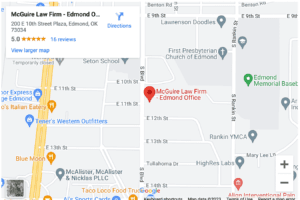Timeline of a Personal Injury Case According to a Personal Injury Lawyer

Each personal injury case is unique. The facts of the case can significantly impact the timeline of a personal injury case. For example, the type of personal injury case can affect the timeline. A car accident case in which liability is not disputed may not take as long to resolve as complex medical malpractice or product liability claims. Likewise, a truck accident case involving an 18-wheeler and multiple vehicles might take longer to resolve than a motorcycle crash involving only two parties.
However, even what appears to be a simple car accident claim could turn into a lengthy, disputed claim that ends up going to trial to resolve.
Other factors that can impact the timeline of a personal injury case include, but are not limited to:
- The type and extent of your injuries
- The duration of your recovery
- The length of the investigation
- Whether fault is disputed
- The parties involved in the claim
- The willingness of the parties to settle the injury claim
- The court's schedule, in personal injury lawsuits
A personal injury lawyer works diligently to resolve your injury claim as quickly as possible without compromising the claim. You can help your attorney move your case forward by following your doctor's treatment plan and responding timely to your attorney's requests.
Steps in the Timeline of a Personal Injury Case
A personal injury lawyer cannot give you an exact timeline for your case. If a lawyer tells you that he can settle your case in a specific amount of time, you might want to get a second opinion. An experienced lawyer understands that each injury case is different. Rushing through the steps of a personal injury case to reach a settlement can jeopardize the case. The client could receive a much lower amount of compensation if the attorney rushes through the case.
Therefore, your attorney can explain the steps of a personal injury case to help you understand the process. He can offer advice based on his experience and knowledge about the complexity of your case, which impacts the timeline. He can also offer general estimates after performing a thorough investigation, but he is not likely to give you any guarantees or firm dates for resolving your personal injury case.
The Basic Steps in a Personal Injury Case include
Not all steps apply in all personal injury cases. The time it takes to move through each step is unique to the case. As your lawyer works on your case, he has a better idea about the case's complexity and a general idea of whether the case might take longer to resolve than other injury cases.
- Injury occurs
- Report the injury
- Seek medical care
- Consult with a personal injury lawyer
- Investigation of accident
- File insurance claims
- Settlement negotiations
- Filing a personal injury lawsuit
It can help you understand the process and timeline of a personal injury case if we discuss each step in more detail.
Injury Occurs
No one ever expects to be injured in an accident or other incident of wrongdoing. Unfortunately, it happens to thousands of people each day. A person is involved in a slip and fall accident, or someone is the victim of nursing home abuse.
Regardless of how your injury occurred, the injury is the beginning of your personal injury case.
Report the Injury
Report your injury immediately. If you are in a traffic accident, call 911 to report the crash and request assistance. If a dog bites you or your child, report the dog bite injury to the dog owner and animal control. When you are injured on another party's property, report the accident to the property owner.
Workplace accidents should be reported to your employer and the property owner, if applicable. Rideshare accidents should also be reported to the rideshare company.
Whenever possible, get a copy of the incident report or accident report. If you can do so safely, take pictures of the accident scene, and make a video with your cell phone. Also, ask eyewitnesses for their contact information.
Seek Medical Care
Prompt medical care is essential after an accident. In addition to taking care of your health, medical care documents your accident injuries.
Without medical documentation of injuries, you cannot recover compensation for damages. Delays in medical treatment can hurt your personal injury case.
Your medical treatment is a significant factor in the timeline of a personal injury case. Your claim should not be settled until you complete medical treatment. Until your doctor releases you and provides a prognosis, you do not know the extent of your injuries.
For instance, did you sustain a catastrophic injury that resulted in a permanent impairment? If so, you could be entitled to substantial compensation for the disability and future damages. Settling your claim before you complete medical treatment could result in a settlement amount that is tens of thousands of dollars below the actual value of your personal injury claim.
Consult With a Personal Injury Lawyer
As quickly as possible after an accident or injury, make an appointment with a personal injury lawyer. The sooner an attorney begins working on your case, the better for you. You focus your energy on your recovery while your attorney focuses on proving that the other party is financially liable for your damages.
An attorney also helps you avoid mistakes that could hurt your case, such as providing statements to insurance adjusters and signing medical release forms. Your injury lawyer protects your best interests, including protecting you from bad faith insurance practices and aggressive insurance adjusters who want to deny and undervalue your injury claim.
Investigation of Accident
While you are receiving treatment for your injuries, your personal injury lawyer investigates the cause of your crash. He identifies each party who might be liable for your damages. He also searches for insurance policies that cover your claim.
Steps that the attorney might take during the investigation include, but are not limited to:
- Request copies of accident reports and incident reports
- Identify and interview eyewitnesses
- Search for evidence, including photographs, videos, and physical evidence, which prove fault and liability
- Consult with your physicians regarding your medical care and prognosis
- Hire experts to assist with the investigation
- Research applicable laws and statutes
The investigation could take many months, depending on the case. However, the investigation occurs during your recovery, so the timeline for these two steps can run together for much of the case.
File Insurance Claims
Your lawyer files claims with all insurance providers who have insurance policies that cover your accident or injury. In many cases, the notices of claims are filed as soon as the attorney is aware that an insurance provider might be liable for your injury.
Settlement Negotiations
After you complete medical treatment and the attorney finishes the investigation, the lawyer is ready to prepare a settlement demand package. The settlement demand outlines your injuries, damages, and the reasons why the other party is liable for your damages.
Settlement demand packages are generally detailed. They include copies of your medical records and other evidence to support your claim. The settlement demand is intended to convince the insurance provider or other party that you are entitled to the compensation demanded and that you would win if you took the case to trial.
In most personal injury cases, the insurance company counter offers after reviewing the settlement demand. Personal injury attorneys generally leave room for negotiating the settlement amount.
Filing a Personal Injury Lawsuit
If the insurance company refuses to agree to a reasonable settlement amount, it is time to file a personal injury lawsuit. There are many phases to a personal injury lawsuit, including filing the initial complaint, discovery, motions, pre-trial hearings, and the trial. Depending on the outcome of the trial, appeals might be filed by either party.
A personal injury lawsuit could take a year or longer to come to trial. Most injury claims settle without filing a lawsuit. Your lawyer discusses all options with you at that time so that you can decide what is best for you.
There are strict deadlines for filing personal injury lawsuits in Oklahoma. Some deadlines are shorter because of the parties involved or the facts of the case. Contacting a personal injury attorney as quickly as possible after your injury can help protect your rights and give you the best chance of receiving fair compensation for your injuries and damages.

